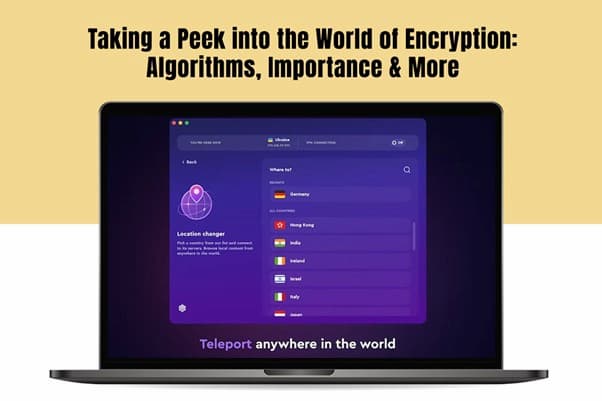Taking a Peek into the World of Encryption: Algorithms, Importance & More
Anyone can access your confidential data if it is not encrypted. The lack of encryption puts your sensitive data at risk. It can be accessed by hackers, scammers, government agencies, etc. They might even steal your identity. Hence, you need to learn about encryption to stay safe and protect your privacy.
Apple understands the importance of encryption, so every Mac comes in-built with FileVault. Mac FileVault disk encryption is a tool that lets you encrypt your files and the entire disk or lock your entire Mac. Nobody can access your data without your permission. To open your encrypted files or documents, you must enter the passcode. Without the passcode, even you cannot access your files. Therefore, remember to save your passcode safely, as well as, the recovery key.
Like Apple, other companies and operating systems also offer in-built encryption methods. You can learn from them by reading the user manual.
Let’s take a deep dive into the world of encryption and understand the different algorithms, their importance, etc.
What is The Meaning Of Encryption?
Encryption is a method by which data or information is converted into secret codes that scrambles and hides the true meaning of the information. This method is essential for companies and individuals to protect confidential information from hacking, theft, and cyber attacks. For instance, websites transmitting bank account numbers and credit card information encrypt this data to prevent fraud and identity theft.
List of The Popular Encryption Algorithms
- Blowfish
Blowfish is an encryption algorithm introduced in 1993 by Bruce Schneier. It is a symmetric block algorithm, and the key size ranges from 32 to 448 bits. The text is divided into blocks of 64 bits, and the encryption algorithm is applied to each block.
Even though this encryption algorithm remains unbreached to date, its use has been largely abandoned in favor of new algorithms.
- Triple DES
3DES, or Triple DES, is an improved version of DES or the Data Encryption Standard algorithm. This algorithm uses a three-fold encryption scheme and generates three 56-bit keys. Using one key at a time, the algorithm encrypts, decrypts, and encrypts the data.
The use of this algorithm has been deprecated after a group of researchers cracked the encryption algorithm using a birthday attack in 2016. This algorithm will no longer be used for communication security purposes after 2023.
- Twofish
Twofish is a successor of blowfish and has a block length of 128 bits. The key length varies between 128, 192, and 256 bits. This is one of the most secure symmetric algorithms, but it comes with a price.
Due to its elaborate encryption process, the algorithm is much slower compared to AES and Blowfish.
- AES (Advanced Encryption Standard)
AES is a symmetric algorithm, which was originally called Rijndael. This algorithm is used in 128, 192, and 256-bit key variations and was the winner of NIST’s competition in 2000.
AES has a sophisticated process that involves four main operations: mixing columns, substituting bites, shifting rows, and adding round keys.
In short, the AES algorithm is not breakable by a brute-force attack.
- RSA (Rivest-Shamir-Adleman)
RSA is an old algorithm based on the mathematical issue of prime factorization. This algorithm generates key sizes in multiples of 256 bits. RSA works best in security apps where management is a problem.
RSA was thought to be unbreachable by brute force, but not after the advent of quantum computers.
What is the Importance Of Encryption?
- Reduce business risks
Data breaches are a nightmare for businesses. If a company loses sensitive user information, a wide range of consequences pops up. For instance, damage to reputation, financial losses, legal actions, decreased customer confidence, and operational disruptions.
The attackers responsible for these breaches use vulnerabilities in the organization’s cybersecurity to break into their system. File encryption is a sturdy layer to cover the weaknesses. Even if cyber criminals access your information, they will need the encryption key to understand the information.
- Safeguard sensitive information
There are potential risks to sharing your computers with others or accidentally misplacing your computer. Without encryption, it won’t be difficult for hackers to extract documents and files from your hard drive if they can access it physically.
Most people keep files containing personal data like addresses, names and social security numbers, financial data, confidential business information, health records, etc. If any of this confidential information is compromised, cybercriminals may use it to steal your identity. They might open new accounts in your name or make fraudulent purchases.
You can protect your information by adding encryption.
- Share data safely
Transmitting data over the web can be dangerous. Snoopers or your ISP might be eavesdropping on your conversation and accessing your private files.
Although TLS protocols like SMTP and HTTPS provide a secure connection to websites you are using, most websites lack TLS connections. Therefore, protect yourself using a VPN and encrypt your files before sharing them.
The Bottom Line
Encryption is vital in today’s digital age. It helps to protect files and personal information. So, do not shy away from encrypting your files and computers.
